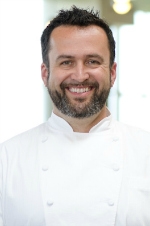Interview with Chef Robbie Lewis of Jardinière - San Francisco
Antoinette Bruno: Why did you start cooking? What or who inspired you to become a chef?
Robbie Lewis: I have always had that wanderlust and I felt that cooking would facilitate traveling and experiencing the world.
AB: Do you feel that attending culinary school was important to the development of your skills as a chef? Would you recommend culinary school to aspiring chefs?
RL: I am a culinary school drop-out. Like anything else in life, you get out of it what you put into it. The best learning environment for me was in a kitchen filled with a focused team. Why pay to learn when you can get paid to learn?
AB: Can you talk about your mentors?
RL: From Traci Des Jardins, opening chef of Rubicon and chef/owner of Jardinière, I learned technique and refinement. She has a cerebral approach to combinations, and a logical, philosophical concept of seasonality and sustainability. From James Moffat of the Slow Club and 42 Degrees, I learned composition and freestyle. As they were both chefs/owners when I worked with them, there was an added dynamic to what they saw and what their concerns were on a daily basis, both front and back of the house.
AB: Are there any unsung ingredients that everyone should know about? What are they?
RL: There really aren't many "unsung" ingredients left. There is a shortage of things to cook that aren't "endangered." I think a lot of us are pressed to cook creatively, but we are also being mindful of the state of the planet and its future.
AB: What is your most indispensable kitchen tool?
RL: I'm a fiend for spoons. I mine flea markets and estate sales looking for them. They are the cooks’ Christmas presents.
AB: Is there a culinary technique that you have either created or use in an unusual way?
RL: I'm a traditionalist when it comes to technique. I enjoy slow cooking techniques - confit, braising and escabeche. I am starting to experiment with slow cooking with an immersion heater.
AB: What advice would you give to aspiring young chefs?
RL: Travel makes a difference - good cooks become great cooks through travel.
AB: What is your favorite question to ask during an interview for a potential new line cook?
RL: Do you know what you’re getting yourself into? What is your favorite cookbook?
AB: Is there a place that you want to travel to for culinary researching purposes? Why there? Which place that you’ve already been to has had the greatest impact on your menus?
RL: Rural Japan - I am ignorant of the cuisine of that region, and I like its complex simplicity and its aesthetic. I've lived and worked in Italy and it clarified for me the concept of "less is more."
AB: What are your favorite restaurants in San Francisco? What is the most memorable meal that you’ve ever had?
RL: I enjoy INO Sushi in Japantown and Burma Super Star. I'm a fan of small houses. I like their soul.
My most positive memorable meal was at Gordon Ramsay's at The Claridge in London. Precise cuisine and coddling service. There’s always great food in San Sebastian.
AB: What trends do you see emerging in the restaurant industry right now?
RL: More attention is being paid to the origins of foodstuffs, the specific farms and ranches, et al. There is also an increasing usage of technologically-based cooking processes.
AB: Where do you see yourself in 5 years? In 10 years?
RL: I truly am happiest when I am overseas, so I would like to run a B&B in Europe somewhere. I'm not picky; I'm happy anywhere. The Algarve, Corsica, Liguria, Dalmatia. I’d lead cooking tours, and drive fanny-pack laden tourists around in my Fiat minibus!






